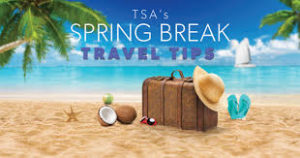T1D Spring Break Traveling Tips

Children, teens, and adults with T1D should not let diabetes control the aspects of their lives that it does not need to control. Please do not let diabetes get in the way of traveling for spring break or for other important reasons.
When flying domestically, simply declaring that you/your child have diabetes is usually enough to allow you to get through security without much hassle. To view the current TSA recommendations related to traveling with T1D, please go to the TSA website or use the following links: https://www.tsa.gov/blog/2009/03/17/traveling-101-diabetics and https://www.tsa.gov/blog/2014/04/01/tsa-travel-tips-travelers-diabetes-or-other-medical-conditions.
If you are leaving the country, it is a good idea to request a letter from your doctor on official letterhead that states your/your child’s medical condition, the medical treatments being taken, and any devices currently in use (e.g. pump or CGM). Carrying this documentation with you will prove very helpful at customs or when going through security checkpoints. Insurance cards are another must-have.
Take some time to make a list of all the medications and supplies that will be necessary to have on your trip, including Glucagon and back-up supplies. It is also a good idea to bring a cooler for insulin and some sealable plastic baggies to keep items dry and protected in the cooler as you travel. While you are at your provider’s office, it is a good idea to ask for samples of back-up insulin and supplies in case you may need them when out of town. This will also help to prevent emergencies should you be unable to return home when planned.
When flying, make sure to always keep your/your child’s insulin with you in your carry-on luggage. Checked bags may be exposed to extreme temperatures that can ruin the insulin. X-rays should not affect blood sugar meters or insulin, but if you are concerned about this or if you are using an insulin pump, it is generally recommended to ask for a manual screening. If you/your child have particular dietary needs, you should notify the airline ahead of time (usually at least 24 hours in advance) to request a special meal, or just bring your own food. It is wise to have snacks on hand in case of low blood sugars or delayed flight times, regardless.
If you are driving for your trip, it is a good idea to have plenty of snacks and drinks available, preferably packed in a cooler in case the vehicle becomes too hot. If you are going to be away from your vehicle for long periods of time, it is a good idea to take the insulin with you and to keep it in a cooled container to avoid overheating.
Planning ahead is the best way to ensure a safe and healthy trip in the setting of T1D.
Safe Travels,
Dr. Joel Hahnke
